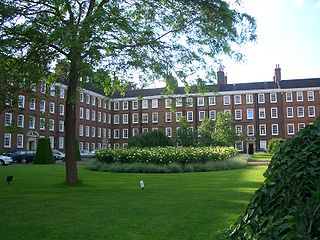Sir Thomas Clayton (c 1612 – 4 October 1693) was an English doctor, academic and politician who sat in the House of Commons in 1660.

The House of Commons of England was the lower house of the Parliament of England from its development in the 14th century to the union of England and Scotland in 1707, when it was replaced by the House of Commons of Great Britain. In 1801, with the union of Great Britain and Ireland, that house was in turn replaced by the House of Commons of the United Kingdom.
Clayton was the son of Thomas Clayton MD of Oxford. He matriculated at Pembroke College, Oxford on 25 May 1627, aged 15 and was awarded BA on 22 January 1629 and MA on 17 October 1631. He was of Gray's Inn in 1633. Further awards from Oxford were B.Med on 18 July 1635 and D.Med on 19 June 1639. He was regius professor of medicine at Oxford from 1647 to 1665. [1]

Pembroke College is one of the constituent colleges of the University of Oxford in England, located in Pembroke Square. The college was founded in 1624 by King James I of England / VI of Scotland, using in part the endowment of merchant Thomas Tesdale, and was named after William Herbert, 3rd Earl of Pembroke, Lord Chamberlain and then-Chancellor of the University.

The Honourable Society of Gray's Inn, commonly known as Gray's Inn, is one of the four Inns of Court in London. To be called to the bar and practise as a barrister in England and Wales, a person must belong to one of these Inns. Located at the intersection of High Holborn and Gray's Inn Road in Central London, the Inn is both a professional body and a provider of office accommodation (chambers) for many barristers. It is ruled by a governing council called "Pension", made up of the Masters of the Bench, and led by the Treasurer, who is elected to serve a one-year term. The Inn is known for its gardens, or Walks, which have existed since at least 1597.
In 1660, Clayton was elected Member of Parliament for Oxford University in the Convention Parliament. [2] He was knighted on 27 March 1661. [3] From 1661 to 1693 he was warden of Merton College, Oxford. [1]
Oxford University was a university constituency electing two members to the British House of Commons, from 1603 to 1950. The last two members to represent Oxford University when it was abolished were A. P. Herbert and Arthur Salter.

The Convention Parliament followed the Long Parliament that had finally voted for its own dissolution on 16 March that year. Elected as a "free parliament", i.e. with no oath of allegiance to the Commonwealth or to the monarchy, it was predominantly Royalist in its membership. It assembled for the first time on 25 April 1660.

Merton College is one of the constituent colleges of the University of Oxford in England. Its foundation can be traced back to the 1260s when Walter de Merton, chancellor to Henry III and later to Edward I, first drew up statutes for an independent academic community and established endowments to support it. An important feature of Walter's foundation was that this "college" was to be self-governing and the endowments were directly vested in the Warden and Fellows.
Clayton was of La Vache, Buckinghamshire. He died at the age of 80.

